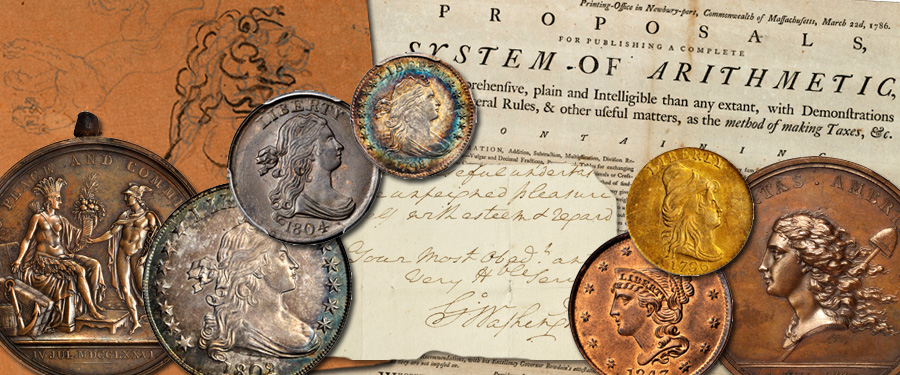
As a follow-up to our January 2013 Americana and August 2015 Chicago ANA sales, collectors will once again have the pleasure of bidding on and perhaps acquiring treasures from the legendary Cardinal Collection in our upcoming October 2015 Rarities Auction. Propelled to numismatic superstardom by the world record-breaking sale of the 1794 Flowing Hair silver dollar, the Cardinal Collection once again is the source of prestigious rarities that will delight the numismatic community.
Encompassing a broad range of early U.S. numismatics, the smaller denominations are represented by an 1804 Draped Bust half cent, an 1839 Modified Matron Head cent and an 1843 Braided Hair large cent, all among the finest certified and with Certified Acceptance Corporation green stickers of approval. A gorgeous Gem 1798/7 Draped Bust dime, pedigreed back to the Col. Green and Newman collections will attract attention, as will a Choice Mint State 1802/1 Draped Bust silver dollar that sits at the top of the Condition Census for the variety, just footsteps away from the finest extant.
The highest denomination represented among these Cardinal Collection coins is a quarter eagle, in this case the revered 1796 Capped Bust Right, No Stars. Scarce in an absolute sense, and virtually unavailable in Mint State, the present offering is an incredible MS-61 example, certified by PCGS, and awarded the coveted gold sticker of approval by CAC, suggesting an even higher level of preservation.
Beyond these spectacular regular-issue rarities, we are honored to present two of the most sought-after and treasured medals of early Americana, both of which were engraved by famed French engraver Augustin Dupre. An iconic bronze “1781” (1783) Libertas Americana medal in Choice Mint State represents a significant offering in and of itself, but in this case is overshadowed by an original bronze “1776” (1796) U.S. Diplomatic medal certified Specimen-55 by PCGS. The Diplomatic medal may not have the widespread fame of more accessible medals like the Indian Peace medals, the Washington Before Boston medals, or the aforementioned Libertas Americana medals, but it remains one of the rarest and most important of all American medals. Conceived in 1790 by Thomas Jefferson and struck in Paris in 1792, these medals were intended to serve as a physical representation of our attempts at foundational diplomacy. The Cardinal Collection example is the finest of just four examples known and has never before been offered in a major U.S. auction, marking this as a monumental opportunity for enthusiasts of early American history.
Offering an even deeper perspective on the origins of these medals are sketches by Dupree depicting the earliest concepts for the design elements. The sketches are wonders to behold, exhibiting a systematic growth of artistic creativity that very closely resembles the final engravings. Also offered is an archive from influential U.S. mathematician Nicholas Pike featuring an autographed letter from George Washington. Pike was instrumental to the proliferation of mathematics in early American education, and wrote to Washington requesting permission to dedicate a forthcoming book to him. The humble Washington declined, but was still sent a published copy two years later, eliciting the letter of praise found in the current archive. It is a privilege to offer them to you today, as they are relics of the most formative years of America and are true national treasures.
Our continued presentation of the Cardinal Collection is sure to delight numismatic enthusiasts with a selection of artifacts that goes unmatched for diversity, rarity and desirability. Please join the excitement when these pieces cross the auction block in our Rarities Auction, October 1, following our offering of the D. Brent Pogue Collection, Part II on September 30. To view the rarities in either of these auctions visit StacksBowers.com or for more information, call our offices at 1-800-458-4646.





